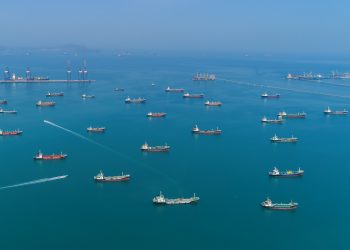Among the main effects of the COVID-19 pandemic was that it changed radically the industry’s status quo, highlighting working conditions in shipping. Meanwhile, global awareness of the adverse effects of climate change globally has put the environment at the top of the agenda in controversial industries, such as shipping and the energy sector. What are the main issues expected to attract the attention of maritime leaders in the near future?
#1 Human sustainability
With seafarers’ wellness as a key pillar, human sustainability is about dignity and respect for every human being in the maritime industry – both at sea and onshore – and describes the human side of maritime trade. This topic has emerged as increasingly important during the pandemic, representing a call for more humanly sustainable practices.
A Future Maritime Leaders essay competition by the Global Maritime Forum earlier in 2022 asked potential leaders of the future to outline what human sustainability might look like for the shipping industry by 2030 and what needs to be done to get there. As the post-pandemic world is transforming rapidly, a more human approach in the well-established, profit-oriented business world becomes more relevant than ever.
#2 Decarbonization
Potential pathways to zero emission shipping have been at the center of discussions for shipping in the last years, especially since the IMO adopted its GHG emissions strategy, which calls for work to start straight away to ensure the availability of alternative fuels and for technology to be developed as soon as possible. Among key efforts, carbon capture and storage projects and a maritime green fund supporting scaling and infrastructure for new fuels are discussed as ways to accelerate decarbonization in shipping.
#3 ESG
2021 was “the year of ESG investments”, according to Reuters, a trend that will not leave shipping unaffected. Standing for Environmental, Social and Governance factors, ESG is vital for describing the criteria that investors use to evaluate a company and determine if this is worth investing in, analyzing material risks and growth opportunities.
In the maritime field, the “environment” constitutes the fundamental pillar where companies develop their ESG strategies. In this respect, there are several priorities that maritime leaders have to focus on if they wish to foster an ESG-driven culture:
- Identify ESG topics and key stakeholders,
- Select an appropriate ESG Framework and criteria,
- Accurately report on ESG performance,
- Invest in training staff ashore and onboard.
#4 Cyber resilience
Enhancing cyber security has been a primary objective for shipping since a cyber attack against the systems of Maersk, the world’s biggest shipping company, made headlines back in 2017. More recently, a cyber-attack hit the London Port Authority and a cyber fraud targeted the Britannia P&I Club.
It becomes evident that the increasing digitalization in maritime comes along with an important responsibility of putting the right safeguards in place to maintain cyber security at sea, said NAPA’s CEO, Mikko Kuosa. Recent research by DNV revealed that the closely related energy sector anticipates damaging cyber-attacks within the next two years. As such, leaders in every vulnerable industry are advised to:
- Allocate budgets for IT enhancement
- Find their firm’s cyber vulnerabilities
- Balance investment between training and technology
#5 Increase diversity
While business leaders have recognized the urgency to build a diverse and inclusive culture, they have been slow to adopt traditional accountability measures and have failed to hold their leadership responsible for meeting and publicizing diversity and inclusion targets, according to a 2021 UN study. Latest data by EU reveal a gender pay gap of 43% in the UK maritime industry alone.
In shipping, racism mostly takes the form of gender discrimination, as any genders other than men are underrepresented especially onboard and in leadership positions, of age discrimination, given that the age gap between employees in the workplace can now be as much as 50 years, and of ethnic backgrounds as shipping is a particularly multi-cultural industry.
Challenging unconscious bias at work is not an easy task and requires all leaders on a self-level to recognize their own biases and then identify which biases are most likely to affect their businesses, to mark the step into transformational leadership, where people feel included and appreciated.
#6 Attract new talent
Attracting people with a diverse set of skills and perspectives to ensure the future success of the industry has been identified as a key challenge for the conventional maritime industry which has to embrace the perspective of the younger generations if it wishes to create awareness and excitement about a maritime career. For example, the next generation of employment consists of digital natives who see the Internet as a given rather than as a luxury.
Meanwhile, soft skills seem to be of higher and higher importance as the industry is moving forward. Soft skills education starts from top management, with seminars and virtual training being a useful asset, experts agreed during last year’s CAREER4SEA Forum.




























































